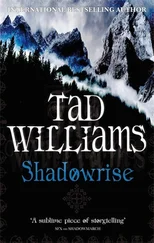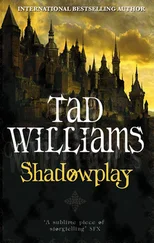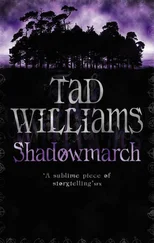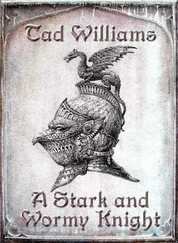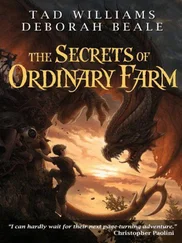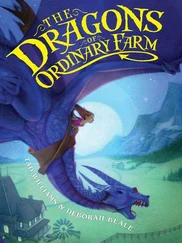As if to underscore this theme of renewal, Merolanna was sitting up in her bed taking soup from one of her maids. The duchess had seemed at death’s door only a few days ago, but today was feeling so much better that Sister Utta had been able to leave the nursing to others and go out of the house for a little while.
“Utta!” Merolanna pushed away her bowl with a trembling hand and shook her head sternly when the maid offered her more. “I have been asking for you, my dear. I feel as though I have been on a long journey. Tell me all the news, quickly—is it true Hendon Tolly and his bullies are gone?”
“Tolly is dead by all reports,” Utta said, sitting on the edge of the bed. “But you should lie back and rest. We will have plenty of time to talk later.”
“Nonsense. At my age?” Merolanna laughed, although her voice was still weak and reedy. “In any case, I have news of my own! I have met my son.”
“What?” Utta’s heart, so buoyant only a moment before at seeing her friend so much better, suddenly felt cold. Was it still the lingering fever, or was this madness something separate and deeper, something that would not go away even if the dowager duchess regained her health? “You saw him?”
“Not just saw him, met him! He came to me!” The old woman laughed again, then frowned as the maid dabbed at a spot of soup on her chin. “Stop that, girl. And Utta, don’t frown. I can tell by your face that you think this some feebleness of mine, or else a piece of fever-foolery, but it was neither. He came to my bedside last night after you slept. I saw him and spoke to him. He even remembered his true name, the name only I know… Adis.” She looked a little abashed. “I named him for the holy Orphan, yes. But even so, it did not protect him—the fairies stole him anyway.”
Now Utta wondered if Merolanna had been tricked by some enterprising beggar-child who thought he had found himself a patroness that could strew the way before him with gold. Utta wasn’t certain what she would do if that were the case. “Is he coming here, then? Did you invite him to stay with you?”
“Of course I did. But he has too much to do. He was very involved in the war against the fairies, you know.” The old woman frowned. “Or was it the war against the southerners? I cannot quite remember. But in either case he has too much to do to stop here with an old woman. But he has scarcely changed since I lost him! Can you imagine!”
Now Utta felt a real chill. “But, Merolanna, when he was lost… that was fifty years ago.”
“I know. Is it not a strange, miraculous thing?” The dowager duchess sat back among the cushions. “Still, I am happy, and he promised I would see him again. Now tell me everything that has happened while I was ill. I am hungry for more than soup… !”
* * *
Barrick looked down at the girl’s face, so familiar and yet so strange. Only a short while earlier, Briony had stood in this same rock chamber, and she too had seemed an inexplicable mixture of the unknowable and the known. Could she really be his twin sister, the one who had sometimes seemed so close that she might have been just another part of himself ? And could Qinnitan, lying here before him lit only by the deathly gleam of a few candles, really be a stranger he had never seen in the flesh until that moment down in the Mysteries?
Qinnitan? Can you hear me? He emptied his thoughts of everything—Saqri, Briony, all that had happened since the last spring moon began to grow—and tried once more. Qinnitan. It’s Barrick. I need you. I need to speak with you. But he could feel nothing in that distant corner of his thoughts and his heart where she had once lived. Qinnitan!
He sat beside her. The Fireflower voices, quiescent and drowsy as sun-warmed bees, murmured to him of the Deathwatch Chamber, of quiet, dignified passage to the beyond, but he did not want to hear it. For once, the knowledge of the kings of the Qar meant little: they knew of no precedent for what was happening. Without the two halves of the Fireflower, there would be no Deep Library, and the voices there would drift into isolated madness. Qinnitan would leave him. Saqri would vanish, too. Soon his head would be empty but for the Fireflower. All of them gone, across the river or waiting on its banks to ford those dark waters. Even Ynnir had all but left him and was running in the far fields, soon to pass onto whatever was next as the earthly bloodline ended.
The idea came to him like a piece of distant music—only another sound at first, but one whose melody at last won out over more random, ordinary noises. Ynnir. The fields. The river…
Barrick sank down into himself, thinking. The candles glowed. After a time some of them had burned so low that they began to flicker and go out, but still he sat beside the motionless form of the dark-haired girl, considering.
“… So she took him by the hand but Kernios sent the spirits of the fearsome dead to follow them and harry them… Zoria went so swiftly that she dared not even look at the Orphan, and he did not cry out or make a sound ...”
—from
“A Child’s Book of the Orphan, and His Life and Death and Reward in Heaven”
Briony knew she should dress properly for the meeting, but it was easier when the time came to go to the duchess’ chambers in her morning robes, with a soft cap on her hair and only one of her ladies to accompany her.
It’s like being a child again, she thought—but, of course, it was nothing like that at all.
Utta met her at the door. For a moment the Zorian sister didn’t seem to know what to do, whether to bow to her or embrace her. Briony relieved her of the decision by opening her arms. “Oh, please, Utta, don’t be a stranger! Not after all that’s happened!”
The old woman smiled and embraced her. Utta was thinner than she had been, as were most of the castle’s residents: the siege had bitten hard in the last months.
“I am so pleased to see you, Princess,” Utta said. “But like all of us, I grieve for your father.”
“Of course.” Briony wiped at her eyes and laughed. “It seems every hour I am either doing my best not to cry or trying to look stern and awful, like a true monarch. Ah, but it’s good to see you.”
“And you, Highness.” Utta looked at her with obvious fondness. Briony was comforted to know that at least a few things hadn’t changed.
Utta led Briony to her great-aunt’s bedside. Briony had been prepared for the change, but seeing Merolanna still shocked her: only months before, the dowager duchess had been the very picture of a vigorous elderly woman. Now she seemed quite diminished, both eyes and cheeks sunken, as if she had begun to shrink inward on herself like fruit spoiling in a bowl. Still, the old woman’s eyes were bright, and when she saw Briony, she was able to lift herself up onto her elbows.
“The Three be praised!” she said. “Utta, push these cushions behind me so I can look at my dear Briony properly.” Merolanna shook her head. She wore only a coif instead of her usual wig and elaborate headdress—even her head seemed to have become smaller. “Come and tell me everything. Your poor father! Oh, what dreadful days we have seen here, dreadful days. But things will be better now.”
Briony was still confounded. It was as if some other player had been brought in to play the part—her great-aunt might have aged ten years since last Winter’s Eve.
“Of course,” she said out loud. “Of course, Auntie ’Lanna. Things will all be better now.”
“You look beautiful and strong, my lady,” Rose Trelling told her. Briony’s other companion Moina had been gone from the castle for months, returned to her family’s great house in the east, but Rose had stayed in Southmarch with her uncle Avin Brone and now had taken back her duties as lady-in-waiting with alacrity. She fastened the clasp on the heavy necklace, which lay too brightly against her mistress’ pale skin, like a string of stars.
Читать дальше



